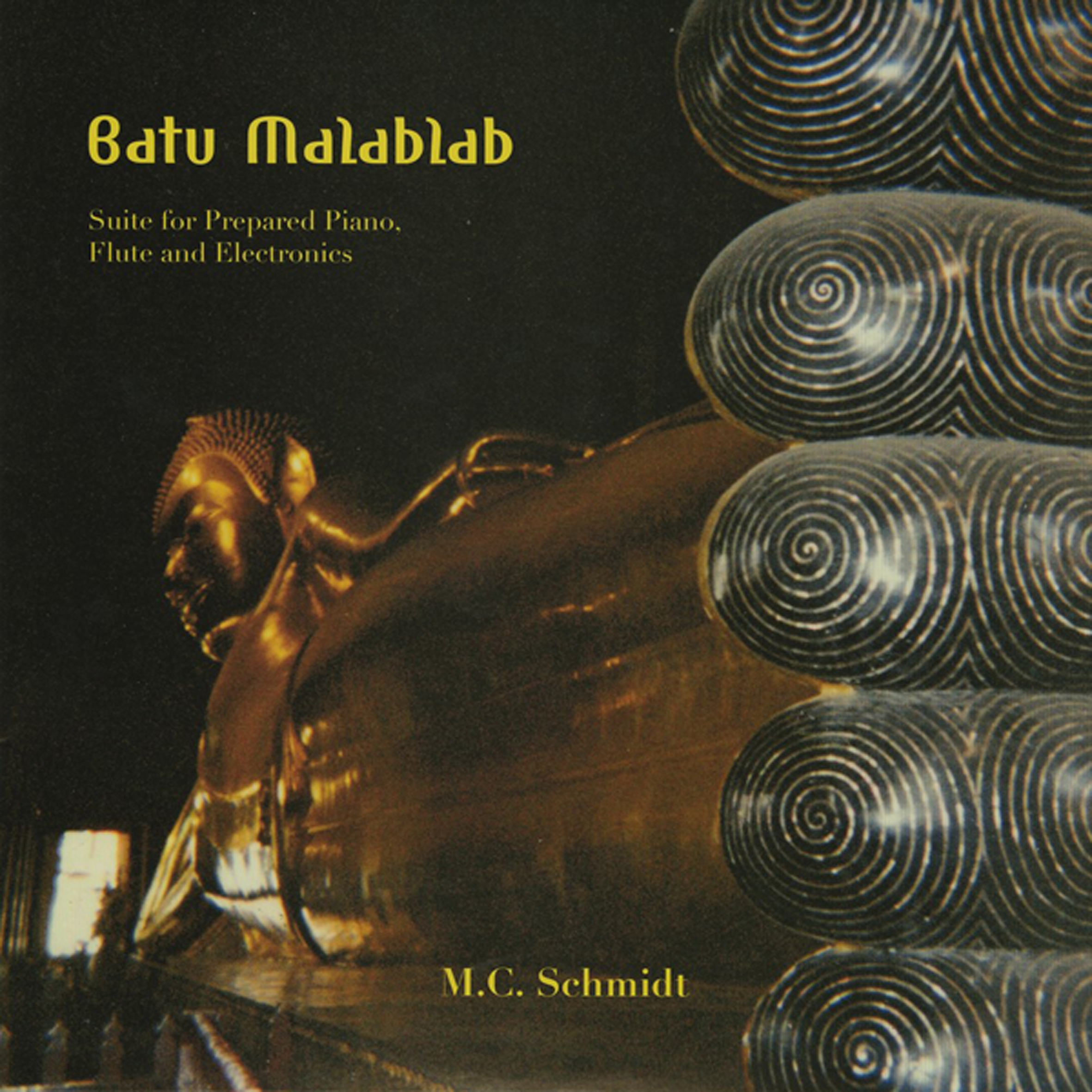M.C. Schmidt, "Batu Malablab: Suite for Prepared Piano, Flute, and Electronics"
 Matmos has long been one of the most uniquely outré and inventive projects around, so it follows that Schmidt's debut solo album would be similarly bizarre and Batu Malablab is certainly that (and more).  In fact, it actually turned out to be far stranger and more challenging than I ever could have imagined: I was expecting a Can- or Harappian Night Recordings-style "ethnographic forgery," but what I got sounds much closer to an electronics-damaged imaginary soundtrack for a '60s Southeast Asian avant-garde theater piece.  Or what the Cannibal Holocaust soundtrack might have sounded like if jointly composed by Cage, Stockhausen, and Harry Partch.
Matmos has long been one of the most uniquely outré and inventive projects around, so it follows that Schmidt's debut solo album would be similarly bizarre and Batu Malablab is certainly that (and more).  In fact, it actually turned out to be far stranger and more challenging than I ever could have imagined: I was expecting a Can- or Harappian Night Recordings-style "ethnographic forgery," but what I got sounds much closer to an electronics-damaged imaginary soundtrack for a '60s Southeast Asian avant-garde theater piece.  Or what the Cannibal Holocaust soundtrack might have sounded like if jointly composed by Cage, Stockhausen, and Harry Partch.
Megaphone/Knock 'em Dead
"Batu Malablab" is a Malay phrase that means "mixed stone."  Aside from that, the only relatively concrete thing that I can say about this album is that it was made using a prepared piano, flute, and electronics and that it consists of two side-long pieces ("Lowland" and "Mountain").  Everything else about Batu Malablab, however, is thoroughly disorienting, inexplicable, and synapse-frying.
I suppose the "Lowlands" side is the more straightforward half of the album, at least initially.  However, it is only straightforward in the sense that it sounds fairly unambiguously like a human improvising on a broken or self-constructed gamelan.  To Schmidt's credit, he does a spectacular job weaving that illusion–were it not for the recording quality, I could easily be convinced that "Lowland" was some kind of Nonesuch Explorer field recording from a remote mountain temple untouched by the modern world rather than a white guy in Baltimore with a piano.  After about four minutes though, things start to go off the rails into uncharted terrain, as Schmidt's plinking and clanking becomes more erratic and is joined by a somewhat dissonant flute, some reverberating clacking, an insectoid whine, and something that sounds like a dying trombone ensemble.  Equally wrong-footing is the structure (or anti-structure): "Lowlands" never quite builds or coheres into something more substantial: it only become more alien, ominous, and disjointed as it unfolds, reaching a deranged anti-crescendo when the eerie synths and vocals appear near the end to evoke a bizarre mood of retro-futurist space-horror.
The "Mountain" side opens with a return to clanking faux-gamelan of "Lowlands," this time embellished with some jungle-type field recordings and a queasy haze of uneasily harmonizing flutes.  Gradually, a menacing rumble intrudes, along with some extremely artificial and space-y vintage synthesizer textures and we are officially back in Crazyville once again.  The transition is more rapid and dramatic this time though, as the piece has completely transformed into some kind of hallucinatory industrial drone/spoken word piece with a woozy backing choir of angelic voices by the six-minute mark. (Un)naturally, it only gets stranger from there, dissolving into a brainsick miasma of backwards vocals, spaced-out electronic blurts and whooshes, and chirping birds before again reverting to its junkyard-gamelan plinking and plonking origins.  I think there might also be some excited monkeys thrown in for good measure.
I do not know that I would necessarily describe Batu Malablab as a great (or even good) album, but it definitely succeeds spectacularly at something and normal quality standards do not seem to apply to whatever it is that has happened here.  It is hard to say exactly what that is though.  The one certainty is that Batu Malablab is the most "difficult" album that I have heard in a very long time, as well as the most "outer limits" vision that I have yet heard from an otherwise sane person.  Also, I suppose Schmidt's most admirable feat with this album is that he boldly and completely avoided anything resembling the here and now, as well as anything resembling straight-up multi-cultural burgling or half-assed pastiche.  Instead, Batu Malablab maniacally careens back-and-forth between an imagined exotic past and a vintage sci-fi vision of the future with no stops in between, resulting in a probable lock for the single most alien and zeitgeist-defying release of 2015.
 



